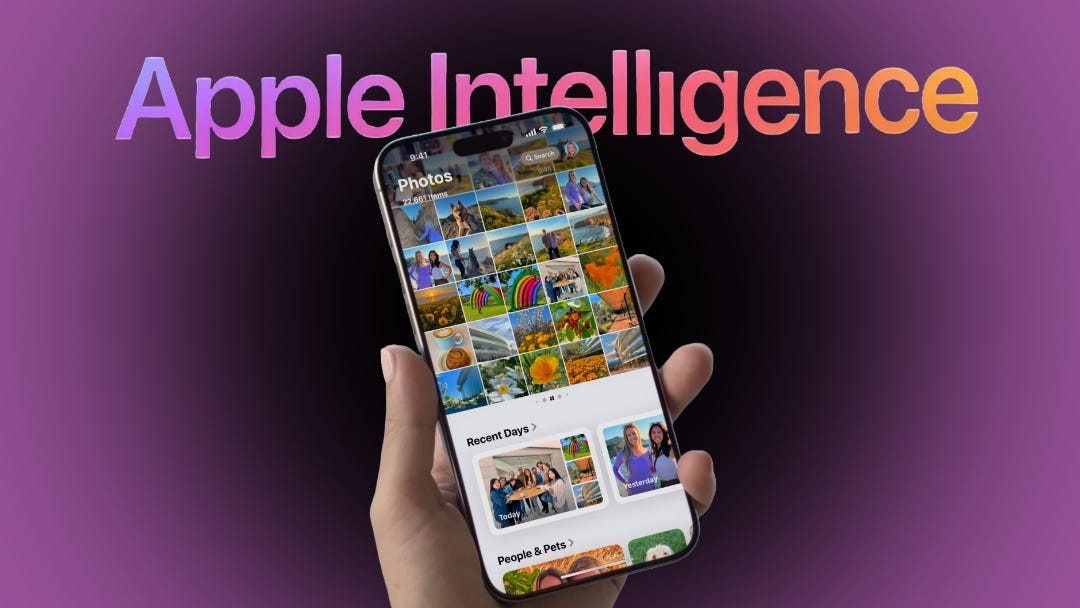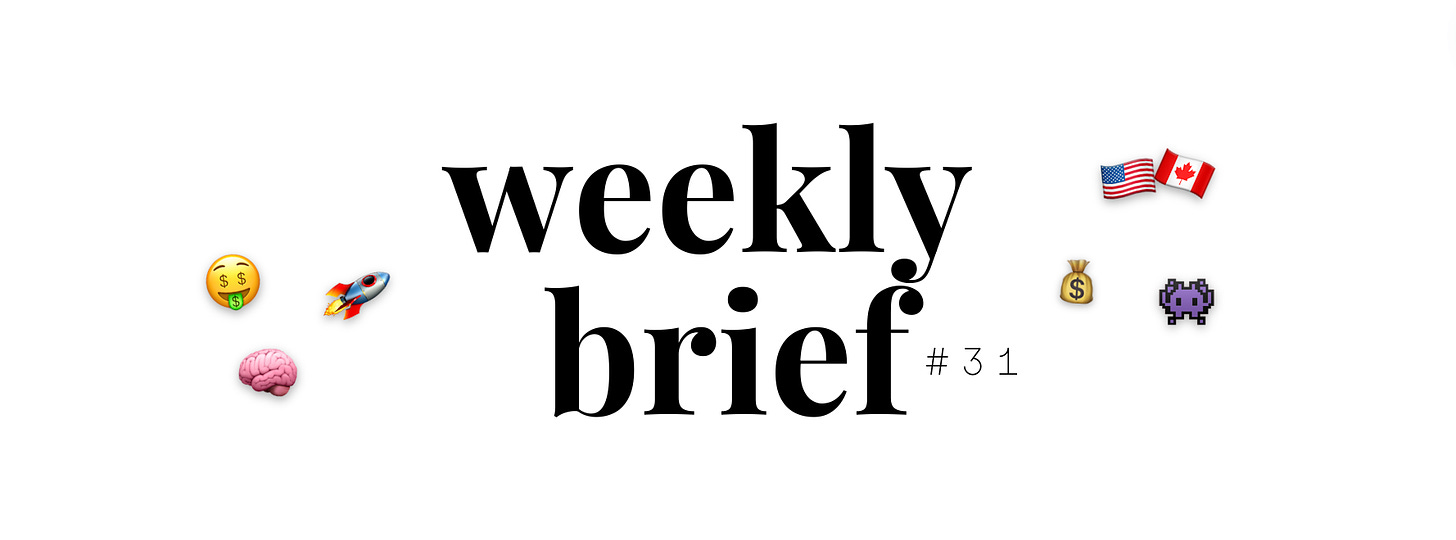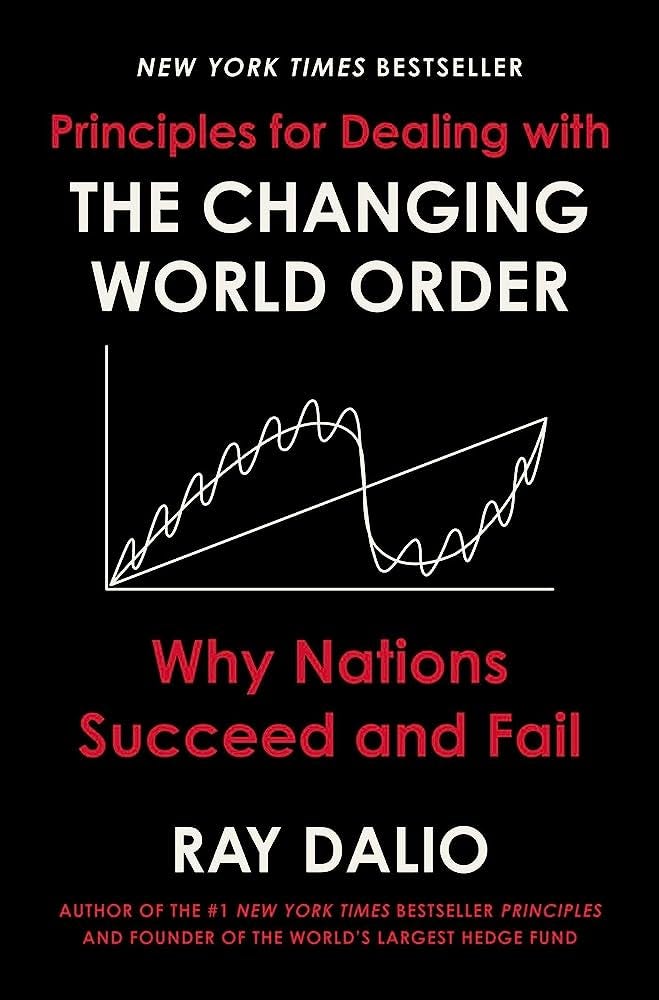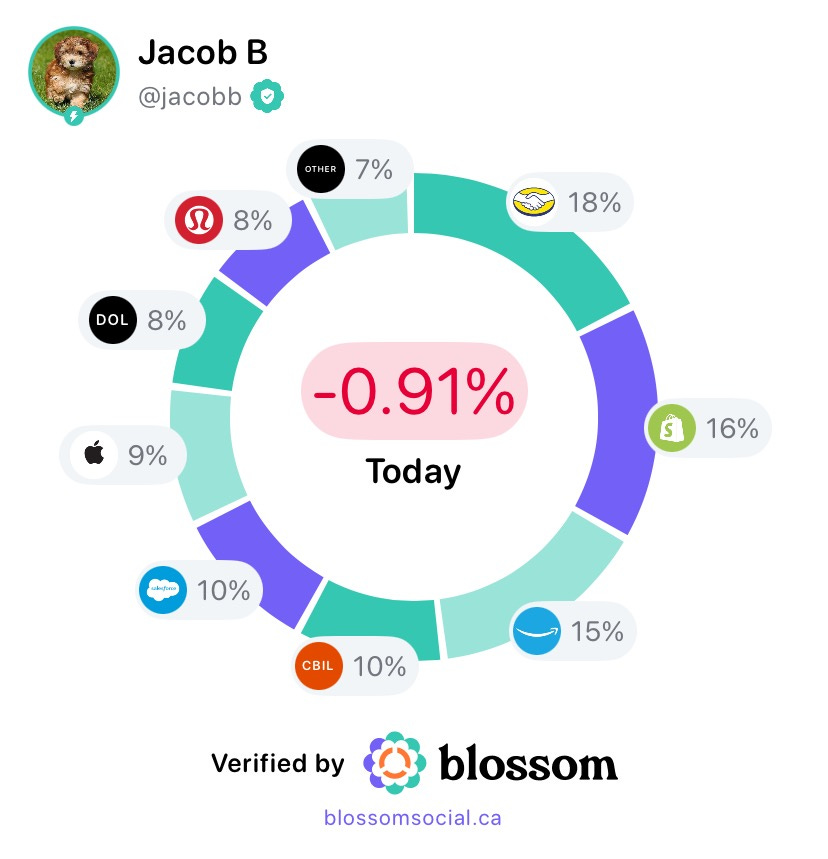Weekly Brief #31
Apple Intelligence, National Bank acquires Western Bank, Elon Musk’s pay package approved, GoDaddy, CrowdStrike join the S&P 500, France calls snap election, Paramount stops merger talks.
Good morning investors 👋,
Happy Friday and welcome or welcome back to the 31st Weekly Brief.
The stock market reached record highs again this week after softer-than-expected CPI inflation data. Mega-cap stocks also rose to record highs, with Apple reclaiming the title of the most valuable company on earth following their AI announcements at WWDC24.
Broadcom also announced a 10-for-1 stock split, and Adobe soared 17% after-hours following a beat on earnings expectations and a raise on revenue guidance from strong software demand.
Obviously, this isn’t all, so let's get into it.
In this issue:
🍎 An AI-powered Apple
💰 Elon Musk’s pay package approved
🇫🇷 France calls snap election
FEATURED STORY

🍎 An AI-powered Apple
Apple’s AI strategy was finally released to the public this week during their highly-anticipated WWDC24 event this Monday. According to Forbes, 75% of consumers are worried about the effects of AI, misinformation, and the usage of their data involved with it. Google made the mistake of not doing proper due diligence and perfecting their model to a T before releasing it, which resulted in their model making many mistakes — generating pictures of African George Washington kind of mistakes.
Apple doesn’t like making mistakes, and when they release a product or service, they want it to be perfect — they want it to be Apple. Apple Intelligence is their newest perfection. An AI platform (and ‘Siri 2.0’) integrated into every Apple device seamlessly.
Worried about the usage of your data in AI? All good, Apple Intelligence and ‘Siri 2.0’ run on-device instead of in the cloud where they can see your data. You’re asking too complex of questions to Siri for on-device capabilities? Again, it’s all good, Apple will send your prompt to their cloud, but they’ll keep that data private via Private Cloud Compute. Your data is yours, not ours, says Apple.
Unlike what most believe, Apple Intelligence is not powered by OpenAI. The only instance of OpenAI in the iPhone is if Private Cloud Compute cannot answer your question. In this instance, Siri will ask for your permission to share your data to ChatGPT to answer your query. The liability is off Apple here, but everything else is branded heavily into the privacy of your iPhone. Privacy, privacy, privacy. It’s your data, you have the control.
Apple, the master of branding, strikes again. Apple learned from the mistakes Google made with Gemini, and implemented AI into their customers products with thorough thought.
I can’t fit much information about Apple Intelligence in this issue due to Substack’s word limits. (If I meet that limit, it won’t let me send it.) So here’s a cool 5-minute video made by Apple that explains it nicely.
Special announcement!
I spent around 6 hours this week working on a massive newsletter issue surrounding Apple (my biggest ever newsletter issue). The above paragraph is a little snippet from this issue I was working on.
It covers my analysis of Apple’s moat and competitive advantage, the stock analysis, the company’s valuation, Apple’s ‘illusion of choice’ strategy, and the future of Apple Intelligence and what this new AI-powered Apple means for them over the next few years.
I have it scheduled for next Monday, but it might even go live this Friday evening. Whichever way it goes, I have a button below with the post link for you to view it regardless. :)
FINANCE

a. 🏦 National Bank acquires Western Bank
National Bank of Canada agreed to buy Canadian Western Bank this week for CA$5 billion in an all-stock deal, paying a 110% premium over the closing share price. The deal requires government approval and two-thirds of CWB’s shareholders’ approval, with completion expected by the end of 2025.
Through this deal, National Bank aims to expand its presence in Western Canada by acquiring CWB’s 39 branches, 65,000 clients, and $37 billion in loans. The deal, although seemingly expensive, offers $270 million in annual pretax synergies but will incur $400 million in integration expenses.
b. 👨💻 GoDaddy, CrowdStrike join the S&P 500
After an index rebalancing this week, which dropped Robert Half, Comerica, and Illumina from the S&P 500, cybersecurity company CrowdStrike, private-equity giant KKR, and web host GoDaddy will join the S&P 500 on June 24. According to S&P, these companies better represent the large-cap range.
Robert Half and Comerica will move to the S&P SmallCap 600, while Illumina will join the S&P MidCap 400. BioMarin Pharmaceutical and Warner Music Group will also join the S&P MidCap 400, with each rising 3% in premarket trading Monday. KKR shares surged nearly 8%, CrowdStrike rose 5%, and GoDaddy gained 3% in extended trading following the announcement.
BUSINESS

c. 🚘 Elon Musk’s pay package approved
After weeks of voting and uncertainty, Tesla shareholders have officially approved CEO Elon Musk’s $56 billion pay package, solidifying his leadership despite some initial pushback from institutional investors. However, the pay package still faces a lawsuit in a Delaware court.
Shareholders also approved relocating Tesla’s headquarters to Texas and re-electing board members Kimbal Musk and James Murdoch. Musk was very optimistic at the annual meeting following the approval and has high hopes for Cybertruck shipments and achieving Tesla’s autonomy goals.
“If I wasn’t optimistic this wouldn’t exist, this factory wouldn’t exist. But I do deliver in the end. That’s the important thing.” — CEO Elon Musk
d. 📺 Paramount stops merger talks
As if the Paramount saga couldn’t have any more drama: National Amusements, the parent company of Paramount, stopped merger talks between Paramount Global and Skydance this week. Despite agreeing to economic terms with Skydance for an $8 billion merger, National Amusements ended the talks over ‘unresolved terms.’
Paramount faces streaming profitability challenges, declining cable-TV customers, and a weak ad market. Over the past few months, the company has received multiple offers, including a $26 billion one from Sony, but has rejected every one. With a debt pile of $14.6 billion, the company is in trouble, and by declining these buyouts, Paramount is digging its own grave.
POLITICS

e. 🇫🇷 France calls snap election
President Emmanuel Macron has called snap parliamentary elections after Marine Le Pen’s National Rally (opposition) secured a significant win in the European Parliament vote. The National Rally party is projected to win 32% of the vote in this election, more than twice that of Macron’s Renaissance party.
Without a majority, passing legislation is difficult, and the recent Parliament vote highlights the country’s opposition to him. Macron hopes for a comeback from his Renaissance party or other parties in these upcoming elections, though the odds favour another victory for National Rally. Two rounds of voting are scheduled for June 30 and July 7, just before the Paris Olympics.
f. 🇺🇦 G7 agree on $50 billion Ukraine loan
G7 leaders agreed on a $50 billion loan package for Ukraine this week using interest from frozen Russian assets. The plan involves using profits from $300 billion in frozen Russian funds, mostly in the EU, with cash expected to reach Kyiv by year-end.
Biden called the frozen asset deal a “significant outcome” and a reminder to Putin that the G7 won’t back down. The agreement was announced at the G7 summit in Italy, attended by Ukrainian President Volodymyr Zelenskiy. Russia condemned the move as criminal, warning of a painful response for the EU.
📚 Book of the Week
Note: I don’t recommend books that I haven’t read or that I would never read. The books I recommend are books I have already read or that I will eventually read.
Principles for Dealing with the Changing World Order — Ray Dalio
Book Description:
From legendary investor Ray Dalio, author of the #1 New York Times bestseller Principles, who has spent half a century studying global economies and markets, Principles for Dealing with the Changing World Order examines history’s most turbulent economic and political periods to reveal why the times ahead will likely be radically different from those we’ve experienced in our lifetimes—and to offer practical advice on how to navigate them well.
A few years ago, Ray Dalio noticed a confluence of political and economic conditions he hadn’t encountered before. They included huge debts and zero or near-zero interest rates that led to massive printing of money in the world’s three major reserve currencies; big political and social conflicts within countries, especially the US, due to the largest wealth, political, and values disparities in more than 100 years; and the rising of a world power (China) to challenge the existing world power (US) and the existing world order. The last time that this confluence occurred was between 1930 and 1945. This realization sent Dalio on a search for the repeating patterns and cause/effect relationships underlying all major changes in wealth and power over the last 500 years.
In this remarkable and timely addition to his Principles series, Dalio brings readers along for his study of the major empires—including the Dutch, the British, and the American—putting into perspective the “Big Cycle” that has driven the successes and failures of all the world’s major countries throughout history. He reveals the timeless and universal forces behind these shifts and uses them to look into the future, offering practical principles for positioning oneself for what’s ahead.
✩ This newsletter, along with my weekly Morningstar fair value estimates and PDFs, will always be free of charge. Your support, whether through a donation or by reading this newsletter and following along, is greatly appreciated.
Thank you for reading today’s Weekly Brief! If you enjoyed or learned anything, please spread the word. An analysis on Apple AAPL 0.00%↑ is coming next week. (It’s arguably the biggest newsletter issue I’ve ever made.)
— Jacob






